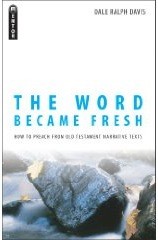April Book Briefs
May 4, 2011Dale Ralph Davis. The Word Became Fresh: How to Preach from Old Testament Narrative Texts (Mentor 2006). Over the past few years, I’ve had a number of conversation that start like this, “Have you ever heard of Dale Ralph Davis? I’m going through his sermons on the Old Testament and they are amazing.” Before this book, I’d never read anything by Davis. But his work has been recommended many times. I can see why. He is good writer and skilled exegete. Anyone who plans on teaching or preaching from the Old Testament would be helped by this book. You’ll see connections and patterns and quirks you’ve never noticed in the Old Testament. Davis is particularly good at keeping his finger on the “theological jugular vein” of a text. He does not, however, think we must preach Christ from every text. Some OT sermons, he says, will be more theocentric than Christocentric. Even if you don’t agree with that approach, his caution against forcing Christ into texts is warranted. All in all, an excellent resource–wise, short, easy to read, full of masterful illustrations and applications.

David Brooks. The Social Animal: The Hidden Sources of Love, Character, and Achievement (Random House 2011). In this new book, the New York Times columnists creates a fictional story about Harold and Erica. He pulls from the latest in brain research to explore how this composite couple makes decisions, grows up, and forms social bonds. Brooks is a terrific writer and the research is folded into an interesting narrative. But I must confess I did not make it through the book. In fact, I didn’t make it very far (so take this “brief” with a generous grain of salt). There was enough material on the nature of sexual attraction to make me uncomfortable. It wasn’t presented in a salacious way, but it wasn’t what I needed to be reading. It’s also hard to read a book that purports to explain why people are the way they are and why they relate to people as they do when the book does not see the world through Christian categories of creation, fall, and redemption. I skipped around and read lots of interesting facts and anecdotes. But at 400 pages, even with Brooks’ talent, I couldn’t plow through the whole thing.

Jonathan Edwards. Religious Affections (Yale University Press 2009). Just to be clear, I did not read this book in the last month. But I did finish it. Our church staff has been plugging away at J-Ed for the last two semesters. We finally finished (sort of limping through the tape). This was the second time I’ve read through the Religious Affections. I liked it more and less the second time around. I like it more because I understood it better, knew what was coming, and found so many wonderful passages that capture the heart of Christian virtue. I liked it less because after lots of good staff discussion I see that Edwards is not helpful to everyone. Religious Affections is a great piece of revival theology, making sense of the Awakening in New England and whether the new experiences were good, bad or indifferent. But as a manual on the Christian life, it is confusing. It can rob the sensitive soul of assurance. Like a good Puritan, Edwards can encourage too much introspection. I think this is one classic that may be better to read through quickly rather than slowly. On a macro level, Edwards’ signs and non-signs make good sense and are full of wisdom. Down in the nitty-gritty, some of Edwards’ distinctions get overly nuanced. Still, as a classic of evangelical theology Religious Affections can get you thinking and feeling more deeply and more biblically.
This content was originally published on The Gospel Coalition
